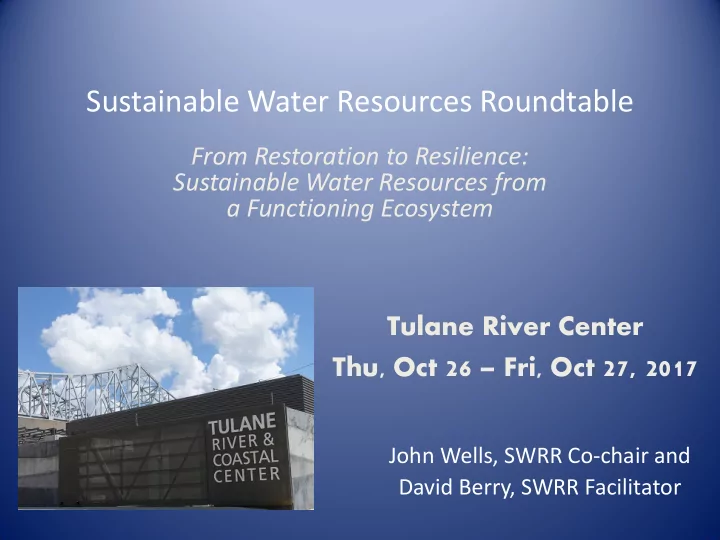

Sustainable Water Resources Roundtable From Restoration to Resilience: Sustainable Water Resources from a Functioning Ecosystem Tulane River Center Thu, Oct 26 – Fri, Oct 27, 2017 John Wells, SWRR Co-chair and David Berry, SWRR Facilitator
Sustainable Water Resources Roundtable A national collaboration of federal, state, local, corporate, non-profit and academic interests A subgroup of the US Advisory Committee on Water Information
Our Mission To promote sustainability of the nation’s resources through … Engagement of people & partner organizations Targeting of research Evaluation of information Development & use of indicators
Our Vision A future in which our nation’s water resources support the integrity of economic, social and ecological systems and enhance the capacity of these systems to benefit people and nature.
Collaboration and Outreach Over 1,000 participants from federal, state, tribes and local governments; corporations; nonprofits and academia Meetings in California; Colorado; Florida; Maryland; Michigan; Minnesota; New Hampshire; Louisiana; Virginia; Washington, D.C. Web site: http://acwi.gov/swrr
Essential Relationships of Sustainability with Water Use
Capital and System Capacities Capital is the capacity to produce value over time Environmental, social and economic systems produce value through flows of services, experiences, or goods that meet human and ecosystem needs over time We achieve sustainability by maintaining capital to meet needs
The SWRR Indicator Framework • Water availability • Water quality • Human uses and health • Environmental health • Infrastructure and institutions
Water Availability Renewable water Upper limit of water availability Water in the environment Water remaining after human uses Water use sustainability Degree to which water use meets current needs while protecting ecosystems and the interests of future generations
Water Quality Quality of water for human uses Drinking, recreation, industry, and agriculture etc. Quality of water in the environment Flora and fauna and ecosystem processes Water quality sustainability Degree to which water quality satisfies human and ecosystem needs
Human Uses and Health Withdrawal and use of water Amount of water withdrawn from the environment and the uses to which it is put Human uses of water in the environment Extent to which people use water for waste assimilation, transportation, and recreation
Human Uses and Health Water dependent resource use Extent to which people use resources lick fish and shellfish that depend on water resources Human Health Extent to which human health may be affected by the use of water and related resources
Environmental Health Indices of biological condition Health of ecosystems Amounts and quality of living resources Productivity of ecosystems
Infrastructure and Institutions • Capacity and reliability of infrastructure – Capacity and reliability of infrastructure to meet human and ecosystem needs • Efficacy of institutions – Efficacy of legal and institutional frameworks in managing water and related resources sustainably
An application of the Indicator Framework: California Water Plan Blueprint for Integrated Water Management & Sustainability 19
The need for Focus on Sustainability: A System in Crisis Reduced Prosperity for Future Generations Greater Drought Impacts - Unreliable Water Supplies Increasing Flood Risk Groundwater Depletion and Subsidence Degraded Water Quality Declining Environmental Conditions Aging Infrastructure 20
Contact Information SWRR Co-Chairs • Robert Wilkinson, Bren School of Environmental Science and Management, University of California, Santa Barbara, wilkinson@es.ucsb.edu • John Wells, 651-686-8615, John R. Wells and Associates, jrwells2411@gmail.com SWRR Director • David Berry, 703-741-0791, davidberry@aol.com • Sustainable Water Resources Roundtable http://acwi.gov/swrr
Recommend
More recommend